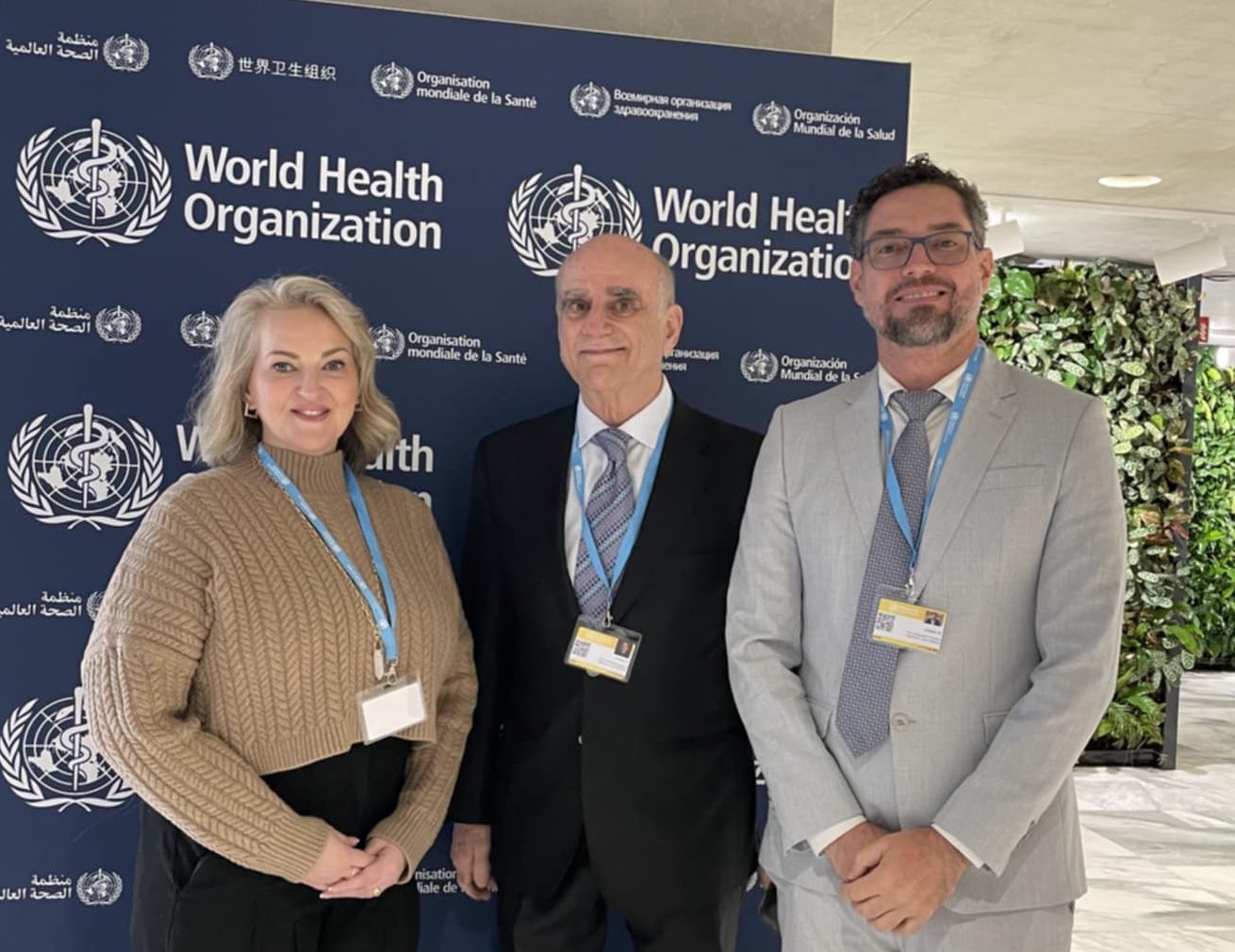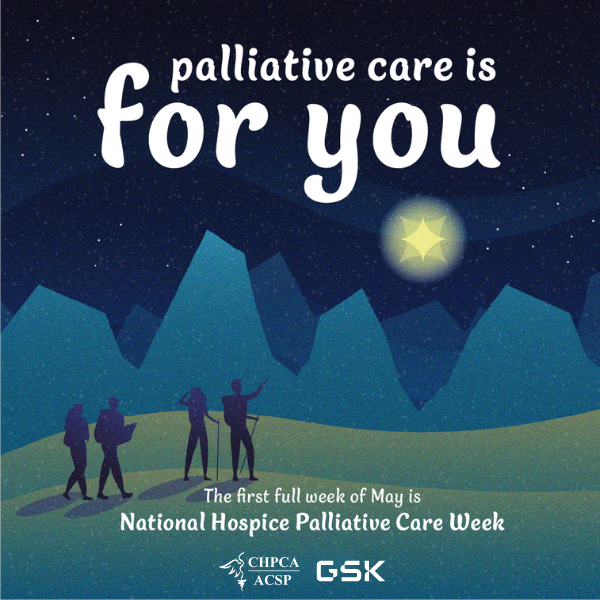National Hospice Palliative Care Week
National Hospice Palliative Care Week is a time to celebrate and highlight the incredible work being done to provide quality palliative care across the country. Join us in recognizing the impact of palliative care on individuals and families, and to call for better access to this care for all. The first full week of May marks National Hospice Palliative Care Week in Canada.
Next National Hospice Palliative Care Week | May 4 -10, 2025
2025 Campaign Theme: Palliative Care is For You
About the Theme
Palliative care can help more people than you might think! Palliative care can help people with serious illnesses, regardless of their prognosis. It can support caregivers and families who are caring for a loved one with a serious illness. It can also support those who are grieving and living with loss.
Palliative care is for you, like the North star guiding travelers, supporting caregivers and their loved ones so you can navigate the illness journey together. With personalized support tailored to your needs, it illuminates the path forward based on what is important to you.
The What, When, and Where of Palliative Care
Talking about palliative care can be hard, but it doesn’t have to be complicated. These easy to read 1-page info sheets answer, in plain language, some common questions about hospice palliative care, when it can help, and where to find it. Learn more and download there info sheets.
Palliative care is for . . .
Martine

Martine has lived with Parkinson’s disease for eight years. She shares a home with her husband and their cat. She is grateful that her sister and nephews help with her care. Lately, Martine’s disease has been progressing, making her new symptoms harder to manage. Now that she needs more and more care, Martine and her family worry about how they will handle the future.
They talk to Martine’s doctor, who refers her to the hospital’s palliative care program. At first, Martine is hesitant—after all, she still has plenty of time left! But after meeting the palliative care team, everyone feels more at ease. The team explains how her symptoms might change and shows them how the program can support her from the hospital. One of Martine’s biggest fears is becoming a burden on her loved ones. She feels better now, knowing that extra help is available to her family if they ever need it.
Her husband now goes to a monthly event for caregivers hosted by the hospice society. The event allows him to spend time with people who understand what he is going through. A hospice volunteer also visits Martine every week.
For Martine, staying independent means being able to walk on her own. This is her top priority so she can remain at home as long as possible with her husband and their cat. If she ever needs more support, the hospital’s palliative care team will be there to help.
Leong Wei

Leong Wei is a devoted son caring for his aging mother, Mrs. Lin, who lives at home with him, his wife, and their children. Mrs. Lin’s health has been getting worse. Wei wants to make sure she is comfortable and cared for at home. But balancing work, family, and caregiving has been overwhelming.
Leong Wei asked the local hospice’s community program for help. Their team knows it is important in Leong Wei ‘s culture for him to care for his mother. They help him manage Mrs. Lin’s changing needs and keep her living at home. They also provide respite care, allowing Mrs. Lin to stay at the hospice for a few days. This respite care gives Wei time to rest and focus on his family.
As she gets sicker, Mrs. Lin is speaking less English and more Cantonese. The hospice program assigned the family a Cantonese-speaking volunteer who visits Mrs. Lin. This helps keep her connected to her community.
Through the hospice program, Leong Wei connects with other caregivers who share similar experiences. Talking to them helps him feel less alone. The hospice also supports his wife and children to help them understand Mrs. Lin’s journey.
With this support, Leong Wei no longer feels like he is doing everything alone. His mother is comfortable, and his family feels cared for too. Now, they can focus on making happy memories and cherishing their time together.
Emma and the Tremblay Family

Parents Sarah and Max Tremblay are always on the go. With three kids, their days are packed. Emma, their youngest, has a rare genetic disorder that makes her very sick. She needs special care every day. Their two older children, Liam and Alice, are very busy with school and extra-curricular activities. Despite their love and dedication, Sarah and Max sometimes feel overwhelmed.
Through a children’s hospice, the family gets the support they need. Emma’s care team helps manage her symptoms so she can be as comfortable as possible. The hospice also provides respite care, giving Sarah and Mike time to rest and focus on Liam and Alice.
The hospice support lets the Tremblay family have fun times. They can enjoy moments without constant worry about Emma’s health. The hospice plans fun things. They take trips to the waterpark, which allow Emma and her family to create happy memories. The hospice helps Liam and Alice learn about Emma’s illness. They join a support group with other siblings who share similar experiences, where they can express their feelings and feel less alone.
Thanks to the palliative care program, the Tremblay family feels supported and stronger. They cherish every moment together, knowing how precious their time with Emma is.
Saul

Saul’s wife, Ruth, died unexpectedly last year of a stroke. Their children, their rabbi, and Saul’s community rallied around him for the first few months after she died. It was hard to relearn how to go about daily life without Ruth. But Saul felt that he was managing okay with everyone’s help.
A few months after Ruth died, everyone slowly returned to their regular lives. That’s when Saul really started to struggle. He began feeling lonely and angry. It didn’t feel like his children, nor his friends, understood what he was going through. It seemed like everyone wanted to “fix” his grief, or his feelings. Saul felt like he was letting everyone down if he showed the sadness he was still feeling inside.
At his local library, Saul learned about a weekly walking group for widows and widowers. Through the walking group, Saul made new friends who could relate to his loss. The compassionate community initiative that hosts the walking group was also helpful in other ways. That’s where Saul learned more about other resources that could support him. Now, he feels better knowing there’s more help for him if he needs it.
Emmett

Emmett is 42 years old and was recently diagnosed with liver cancer. It was a shock, and he felt overwhelmed worrying about what would happen next. His doctors started him on treatment right away. They also connected him with the hospital’s palliative care team for extra support.
It’s important to Emmett that he be able to keep living his life as well as he can during his treatments. The palliative care team helps Emmett with his symptoms, such as nausea and tiredness. They also connect him with a counselor who helps him cope with the emotional ups and downs of having cancer. Talking to someone who understands makes a big difference.
Emmett worried that his care team wouldn’t include his partner Ryan in his care. But his palliative care team makes them both feel safe and supported. They include Ryan in discussions about Emmett’s care, connect Ryan to a caregiver support group, and help them plan for the future.
With palliative care as part of his treatment, Emmett feels more in control. He knows he’s not alone, and that his care is about more than his illness. His care is about his whole well-being. Now, he can focus on living life, spending time with Ryan, and staying hopeful for the road ahead.
Thank you to our generous 2025 National Hospice Palliative Care Week sponsor:


Your Donations Matter
CHPCA advocates for accessible quality hospice palliative care across the country. We do this so one day, everyone in Canada with a life-limiting illness can access care that alleviates their suffering when they need it most. Your support is essential to this work.

Abstract Submission is Now Open for the 2025 CHPCA Conference
Abstract submission is now open for the 2025 CHPCA conference.

WHPCA Board Member and CHPCA CEO Laurel Gillespie Advocates for Global Access to Palliative Care at WHO Executive Board Meeting
CHPCA proudly shares that CEO Laurel Gillespie, trustee of the Worldwide Hospice Palliative Care Alliance (WHPCA), attended the 156th session of the Executive Board of the World Health Organization (WHO).

CHPCA Announces 25 Recipients for the King Charles III Coronation Medal
CHCPA is happy to announce 25 recipients of the King Charles III Coronation Medal. As a nominating partner organization for the Coronation Medals, CHPCA is proud to recognize these champions for hospice palliative care from across Canada with this honour.




